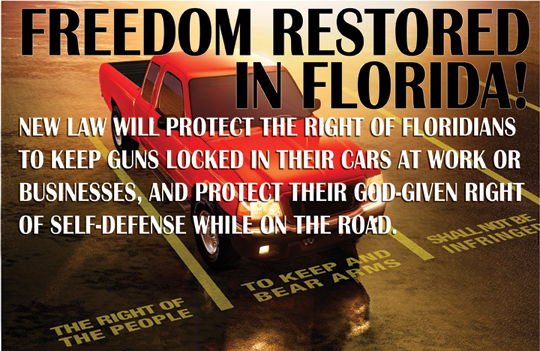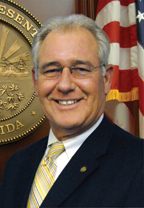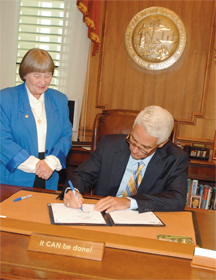
After sparking America`s Right-to-Carry revolution in 1987 by passing its "shall-issue" carry law, then reinforcing that right in 2005 by passing landmark "Castle Doctrine" legislation, Florida is again leading the nation in securing your Second Amendment rights--this time, by passing a law protecting the right to have a firearm in your vehicle when driving to work, shop, do business or go anywhere you have a right to be.
Titled the "Preservation & Protection of the Right to Keep & Bear Arms in Motor Vehicles Act," the measure was signed into law by Florida Governor Charlie Crist on April 15 after a three-year fight in the state legislature. The law takes effect July 1, 2008.
Under the new law, employers, retailers and businesses cannot negate your right to self-defense by banning legally-owned firearms in locked vehicles in business parking lots. If you`re an employee of a company with a gun-ban policy, the legislation sanctions your right to keep a firearm in your locked vehicle in the company parking lot if you have a valid Right-to-Carry license. The law puts an end to law-abiding employees being forced to travel unarmed and defenseless to work because of gun bans at those business destinations. And it puts an end to gun-ban businesses prohibiting a customer, vendor or "invitee" from keeping a firearm locked in a parked car while conducting business at the facility--no RTC license required.
"The U.S. Constitution begins, `We the people,` not, `We the corporation,`" said former NRA President Marion P. Hammer, who helped push the bill through the Florida Legislature.
"Customers and workers should not have to choose between protecting themselves or following the political policies of anti-gun businesses," she added. "What you have inside your personal private vehicle, as long as it`s legal property and lawfully possessed, is nobody`s business no matter where you park your car."
Businesses have been violating the constitutional and statutory rights of employees and customers because previously there were no penalties for such violations. Businesses knew the only recourse for an employee or customer was to file a personal lawsuit against the business. Few average citizens have the resources to afford legal action and certainly an employee who has just been fired could not afford a lawsuit--that is a circumstance upon which some of the offending businesses depended.
Since average citizens often have difficulty bringing legal action against an employer or business for violating his or her rights, the new law requires the Florida Attorney General to bring legal action, on behalf of the employee or customer, against the employer or business. The Attorney General must initiate a civil or administrative action for damages, injunctive relief and civil penalties, and such other relief as may be appropriate, or may negotiate a settlement on behalf of any person whose rights under the new law have been violated. However, a person whose rights under this law have been violated still has the right to bring a personal civil action against the offending business. Additionally, under Florida Statute 760.51(2), any business that violates the provisions of the new law may be fined $10,000 for each violation.
 |
| Florida State Rep. Greg Evers sponsored the legislation and helped move it through the legislature. |
Your Livelihood . . . or Your Life? In a letter sent to every member of the Florida Senate, Orlando attorney Ernest J. Myers told of a 61-year-old woman who had phoned him, in tears, after being sent home from her job. Her employer had found out that she held a Right-to-Carry license and kept a firearm for self-protection locked in her vehicle while at work.
Although the company didn`t have a policy against firearms, the only way her employer would let her return to work was if she would sign a written pledge that she would never again have a firearm locked in her vehicle while at the office or on company business.
"She asked me what I could do to help her," the attorney related in his letter. "Unfortunately, I was helpless. Without the protections offered by H.B. 503, this woman`s employer had the power to make her choose between her livelihood and her personal safety." He urged the Senate to pass the bill.
In another case, after being accosted on their way to work, a Florida couple who worked together was advised by law enforcement to purchase a firearm for protection during their commute, which the man did.
However, just days before their 10th anniversary of employment, both were fired. While being questioned about an absence from work, the wife revealed that she didn`t feel safe commuting without her husband, because he had a personal protection firearm that he stored in the locked vehicle while at work.
Her employer had the vehicle searched, the firearm was found in the locked vehicle and the man and his wife were fired for violating the company`s policy against firearms on their property.
Who was their employer? The Walt Disney World Company, whose Magic Kingdom in Orlando, with 50,000 employees, is the largest employer in Florida.
In another instance in a Wal-Mart parking lot in Orlando, a woman was brutally beaten and raped, and the incident was videotaped on the store`s "security" cameras. Ironically, on the day Marion Hammer appeared on television to discuss the urgently needed self-defense bill, the network`s "Breaking News" announced the apprehension of the violent perpetrator. While the rapist was ultimately arrested, that`s undoubtedly small solace to the unarmed victim shopping at that gun-ban retailer.
"Ask yourself: Would that poor woman rather have had a gun in her car in the parking lot to defend herself against rape?" Hammer rightly pointed out. "Or do you think she preferred to have Wal-Mart video her being brutally raped, for all the world to see, so authorities could use the tape to identify and capture the rapist--thus providing her with the opportunity to go through a trial and testify against the rapist and relive the rape and trauma over and over again?"
Restoring Your Rights To restore the rights that some Florida businesses had usurped from gun owners, in 2006 NRA-ILA launched an effort in the Florida Legislature to pass legislation designed to protect both the rights, and the lives, of Florida citizens.
It was a long and hard-fought battle. In 2006, the legislation died in committee. In 2007, House committee members rejected the bill just two days after the tragic mass murders at Virginia Tech.
This year, Florida NRA members and gun owners turned up the heat, swamping legislators with letters and e-mails like a Miami hurricane.
State Rep. Greg Evers, sponsor of H.B. 503 and State Sen. Durell Peaden, who sponsored the Senate version of the bill (S.B. 1130), along with Rep. Dean Cannon, who negotiated the substitute bill through the House, all reported receiving 3,000 to 4,000 e-mails about the legislation--virtually all supporting it--in March alone.
In April, Florida`s Senate and House finally adopted the bill. The members of both houses voted along party lines, with Republicans supporting the bill and Democrats opposing it, although in the House, four Republicans voted against it and three Democrats voted for it.
"Florida NRA members and gun owners have again set an example for the rest of the country with their passion and persistence," said NRA-ILA Executive Director Chris W. Cox. "They stayed in the fight for as long as it took to win. Now all Floridians will be safer as a result."
It was a heavyweight bout, to be sure.
Despite opposition from some of the most powerful political interests in Florida, and despite their threats to sue, the bill cleared the legislature and was signed by Governor Crist, giving--in the words of the Orlando Sentinel--"a major election-year victory to the National Rifle Association."
Reasonable Remedies Anti-gun groups screeched, as they always do, that the measure was "extreme," and did their best to kill it. But the final legislative product was, as Hammer put it, "a good bill whose time had come."
Under the new law, employers and business owners:
- Cannot search a vehicle for a firearm;
- Cannot ask an employee whether he/she has a firearm or a Right-to-Carry license;
- Cannot condition employment on whether an applicant has a Right-to-Carry license;
- Cannot prohibit a worker from legally keeping a firearm locked in a vehicle;
- Cannot fire or discriminate against an employee who has a Right-to-Carry license, owns a firearm, stores a firearm locked in a vehicle or uses a firearm lawfully in self-defense;
- Cannot order a customer to leave a parking lot for having a firearm locked in a vehicle.
Moreover, since the names of Right-to-Carry license holders are kept confidential under Florida privacy laws, no employer can do an Internet search to see whether you hold a license to carry a gun.
It`s a shame that it has taken this long to force Florida employers and businesses to respect the rights of Florida`s citizens. As Hammer wrote in a letter to the editor of the South Florida Sun-Sentinel:
"The U.S. and the Florida Constitutions both give citizens the right to keep and bear arms and the right of self-defense. Further, Florida Statute 790.25 (5) specifically authorizes the carrying of firearms in private vehicles for lawful purposes.
"Then, do business owners have a right to preempt constitutional and statutory rights? The answer is no. But they are doing it anyhow, and it must
be stopped.
"Constitutional and statutory rights do not stop when a law-abiding person drives into a parking lot," Hammer concluded.
Anti-Gun Groups Fight On Yet even the right to defend yourself from harm has its enemies--chiefly among corporate interests.
Despite the fact that the measure has always contained provisions that shield businesses from liability in the event of accidents and criminal conduct by an employee or customer, powerful business interests still actively fought the measure. And now that it has passed, they vow to overturn it.
The Florida Chamber of Commerce and Florida Retail Federation vow to spend more than $250,000 to fight the law. Yet as Hammer has pointed out, even Barry Richard, the attorney hired by the Florida Chamber to pitch its side, has acknowledged the truth.
In a footnote to a 2006 opinion paid for by the Florida Chamber, Mr. Richard candidly warned, "The right to control one`s property is not absolute. The state can regulate use of and access to property for the purpose of protecting the public health, safety and welfare. State statutes, for example, prohibit the possession of certain materials on private property that constitute a public nuisance or safety hazard ... or the exclusion from public accommodations based upon race, gender, handicap, religion or national origin."
During debate in the legislature, business lobbyists fighting against the self-defense measure continually came back to the property rights argument, as if an employee`s or customer`s automobile is not "private property" worthy of protection. And that argument completely ignores Florida citizens` Right to Keep and Bear Arms protected by both the U.S. Bill of Rights and the Florida Constitution.
That arbitrary corporate gun ban leaves employees and others traveling to and from businesses with no means to protect themselves while en route, and ignores the fact that by banning firearms from their parking lots, business owners provide a place for criminals to prey on unarmed victims with little worry that those victims could fight back.
"As we`ve seen over and over again," said NRA Executive Vice President Wayne LaPierre, "from colleges to shopping malls to places of employment, so-called `Gun-Free Zones` do nothing more than give maniacs the confidence and ability to kill with impunity.
"More than anything else, what`s at stake here is your right to protect yourself and your family when no one else can or will," LaPierre continued. "No one can legitimately take that right away. This new law simply reflects and reinforces that truth."
Hammer summed the entire situation up quite succinctly.
"Tell me where in the Constitution it says corporations or big business have the right to supersede individual and constitutional rights," she said. "I asked opponents of the bill that question and they couldn`t tell me."
Hijacking the Constitution
The Constitution is about protecting the rights of individual people. But today, some of Florida`s corporate giants are trying to hijack our Constitution and circumvent the Florida Legislature and Gov. Charlie Crist. |














 More Like This From Around The NRA
More Like This From Around The NRA






